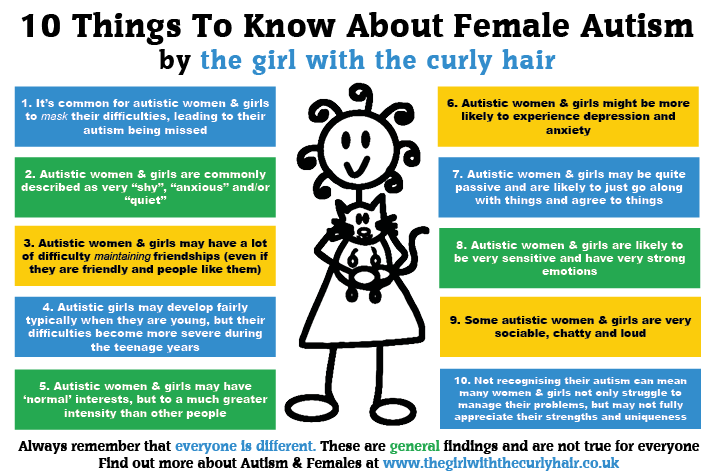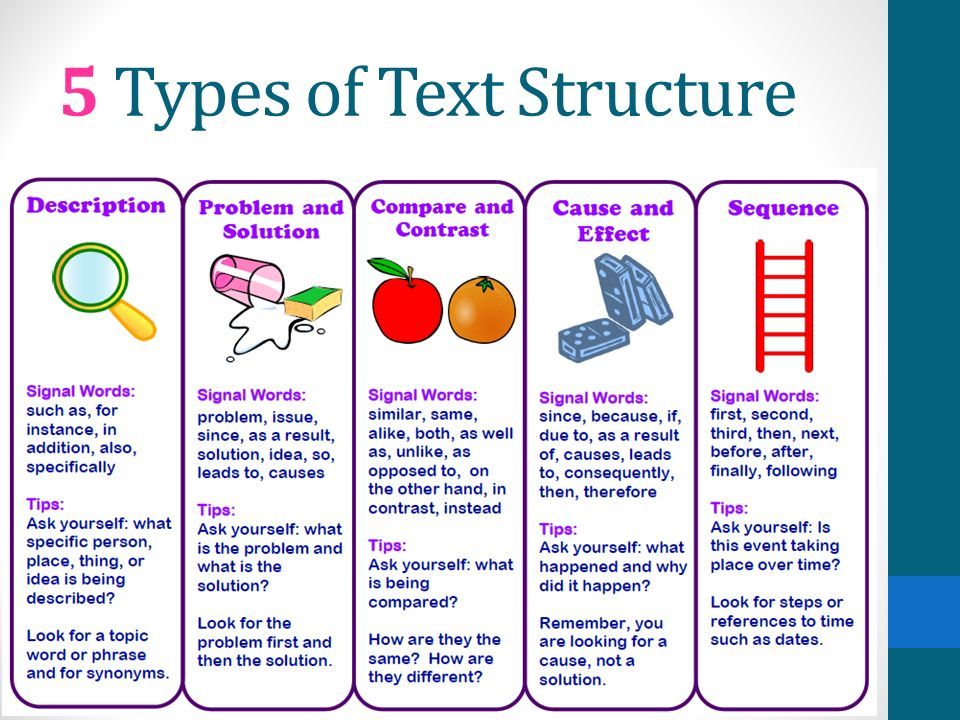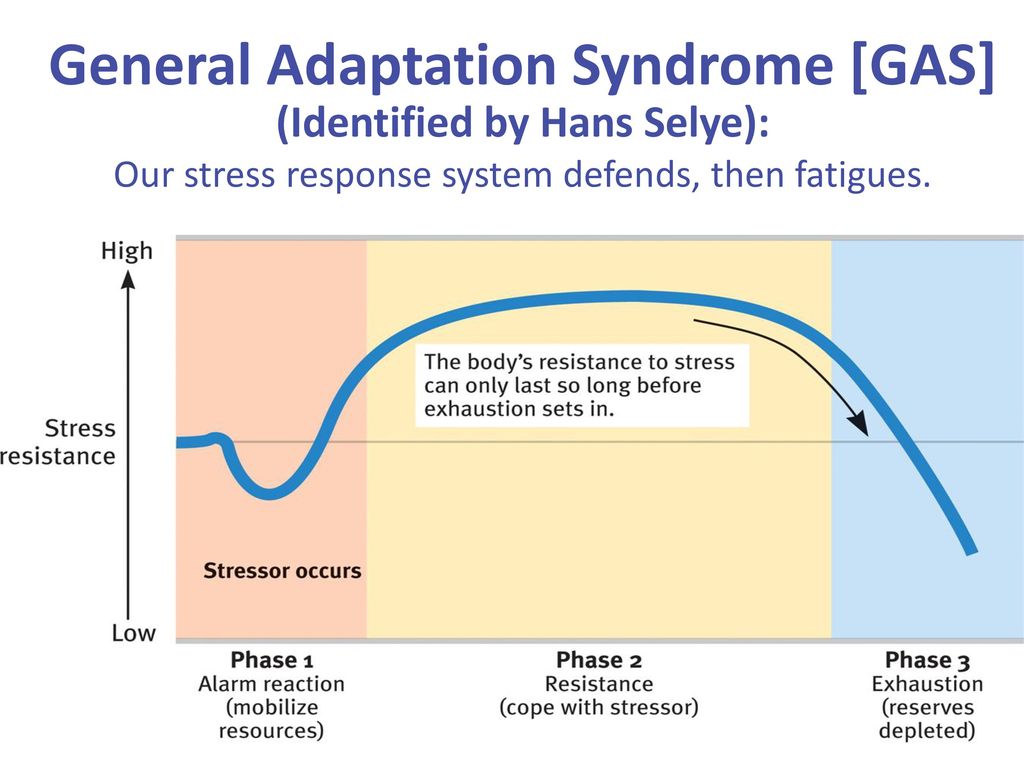Intj introverted intuitive thinking judging
INTJ Introverted iNtuitive Thinking Judging
ADVERTISEMENT
Introverted iNtuitive Thinking Judging
To outsiders, INTJs may appear to project an aura of "definiteness", of self-confidence. This self-confidence, sometimes mistaken for simple arrogance by the less decisive, is actually of a very specific rather than a general nature; its source lies in the specialized knowledge systems that most people of this type start building at an early age. When it comes to their own areas of expertise -- and INTJs can have several -- they will be able to tell you almost immediately whether or not they can help you, and if so, how. INTJs know what they know, and perhaps still more importantly, they know what they don't know.
People of this type are perfectionists, with a seemingly endless capacity for improving upon anything that takes their interest. What prevents them from becoming chronically bogged down in this pursuit of perfection is the pragmatism so characteristic of the type: INTJs apply (often ruthlessly) the criterion "Does it work?" to everything from their own research efforts to the prevailing social norms. This in turn produces an unusual independence of mind, freeing them from the constraints of authority, convention, or sentiment for its own sake.
INTJs are known as the "Systems Builders" of the types, perhaps in part because they possess the unusual trait combination of imagination and reliability. Whatever system this type happens to be working on is for them the equivalent of a moral cause to an INFJ; both perfectionism and disregard for authority may come into play, as INTJs can be unsparing of both themselves and the others on the project. Anyone considered to be "slacking," including superiors, will lose their respect -- and will generally be made aware of this; INTJs have also been known to take it upon themselves to implement critical decisions without consulting their supervisors or co-workers. On the other hand, they do tend to be scrupulous and even-handed about recognizing the individual contributions that have gone into a project, and have a gift for seizing opportunities which others might not even notice.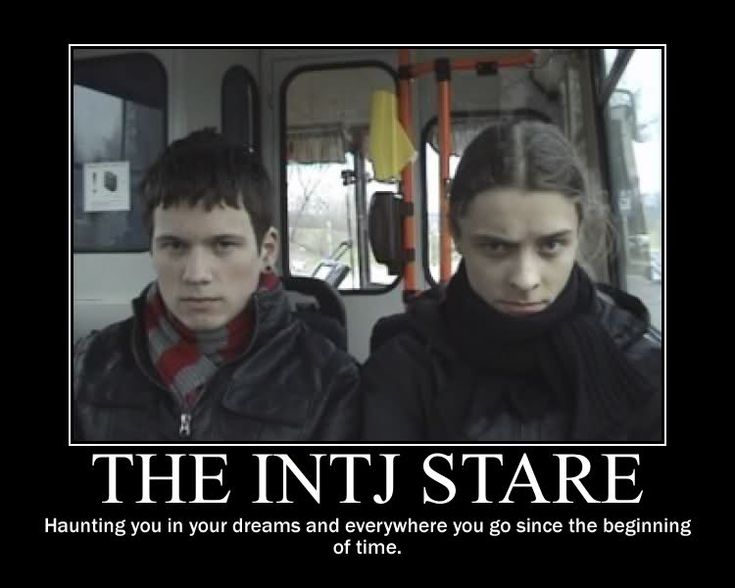
In the broadest terms, what INTJs "do" tends to be what they "know". Typical INTJ career choices are in the sciences and engineering, but they can be found wherever a combination of intellect and incisiveness are required (e.g., law, some areas of academia). People of this type can rise to management positions when they are willing to invest time in marketing their abilities as well as enhancing them, and (whether for the sake of ambition or the desire for privacy) many also find it useful to learn to simulate some degree of surface conformism in order to mask their inherent unconventionality.
Personal relationships, particularly romantic ones, can be the INTJ's Achilles heel. While they are capable of caring deeply for others (usually a select few), and are willing to spend a great deal of time and effort on a relationship, the knowledge and self-confidence that make them so successful in other areas can suddenly abandon or mislead them in interpersonal situations.
This happens in part because many INTJs do not readily grasp the social rituals; for instance, they tend to have little patience and less understanding of such things as small talk and flirtation (which most types consider half the fun of a relationship).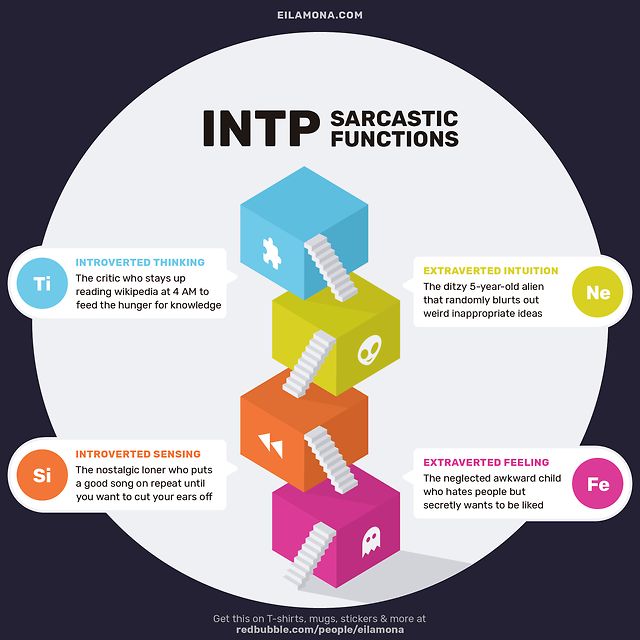 To complicate matters, people of this type are usually extremely private, and can often be naturally impassive as well, which makes them easy to misread and misunderstand. Perhaps the most fundamental problem, however, is that INTJs really want people to make sense. :-) This sometimes results in a peculiar naivete', paralleling that of many Fs -- only instead of expecting inexhaustible affection and empathy from a romantic relationship, the INTJ will expect inexhaustible reasonability and directness.
To complicate matters, people of this type are usually extremely private, and can often be naturally impassive as well, which makes them easy to misread and misunderstand. Perhaps the most fundamental problem, however, is that INTJs really want people to make sense. :-) This sometimes results in a peculiar naivete', paralleling that of many Fs -- only instead of expecting inexhaustible affection and empathy from a romantic relationship, the INTJ will expect inexhaustible reasonability and directness.
Probably the strongest INTJ assets in the interpersonal area are their intuitive abilities and their willingness to "work at" a relationship. Although as Ts they do not always have the kind of natural empathy that many Fs do, the Intuitive function can often act as a good substitute by synthesizing the probable meanings behind such things as tone of voice, turn of phrase, and facial expression. This ability can then be honed and directed by consistent, repeated efforts to understand and support those they care about, and those relationships which ultimately do become established with an INTJ tend to be characterized by their robustness, stability, and good communications.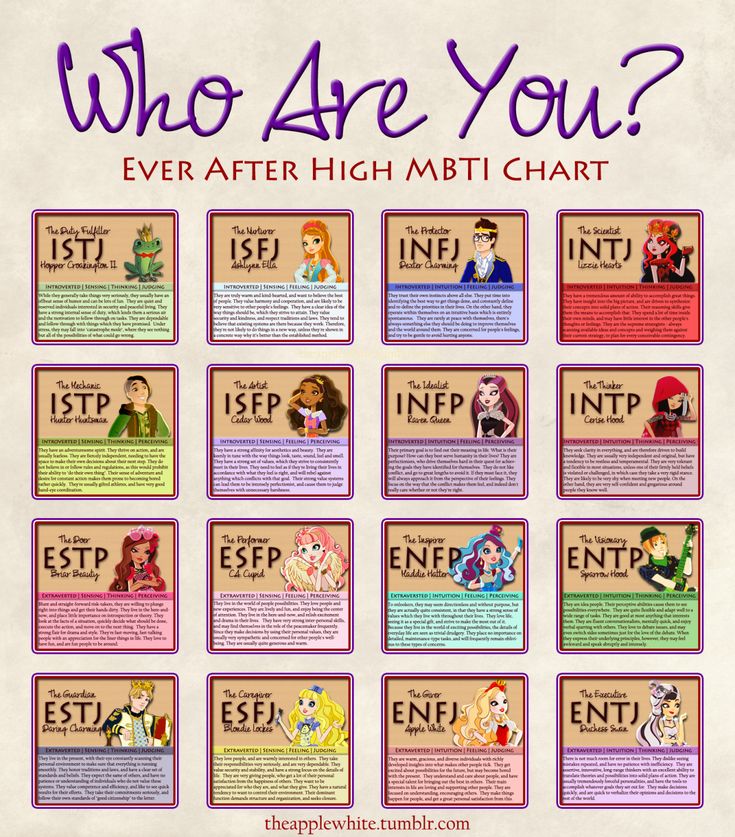
(INTJ stands for Introvert, iNtuitive, Thinking, Judging and represents individual's preferences in four dimensions characterising personality type, according to Jung's and Briggs Myers' theories of personality type.)
What is your personality type? Take the Test!
ADVERTISEMENT
Based on Jung’s framework of cognitive functions
Introverted iNtuition
INTJs are idea people. Anything is possible; everything is negotiable. Whatever the outer circumstances, people of this type are ever perceiving inner pattern-forms and using real-world materials to operationalize them. Others may see what is and wonder why; INTJs see what might be and say "Why not?!" Paradoxes, antinomies, and other contradictory phenomena aptly express these intuitors' amusement at those whom they feel may be taking a particular view of reality too seriously. People of this type enjoy developing unique solutions to complex problems.
Extraverted Thinking
Thinking in this auxiliary role is a workhorse.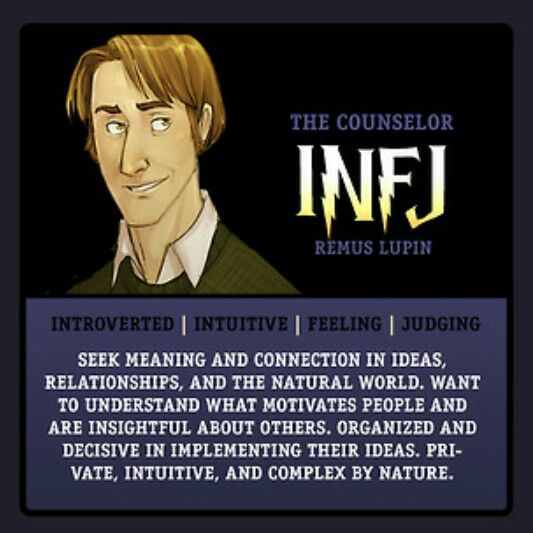 Closure is the payoff for efforts expended. Evaluation begs diagnosis; product drives process. As they come to light, Thinking tends, protects, affirms and directs iNtuition's offspring, fully equipping them for fulfilling and useful lives. A faithful pedagogue, Thinking argues not so much on its own behalf, but in defense of its charges. And through this process these impressionable ideas take on the likeness of their master.
Closure is the payoff for efforts expended. Evaluation begs diagnosis; product drives process. As they come to light, Thinking tends, protects, affirms and directs iNtuition's offspring, fully equipping them for fulfilling and useful lives. A faithful pedagogue, Thinking argues not so much on its own behalf, but in defense of its charges. And through this process these impressionable ideas take on the likeness of their master.
Introverted Feeling
Feeling has a modest inner room, two doors down from the Most Imminent iNtuition. It doesn't get out much, but lends its influence on behalf of causes which are Good and Worthy and Humane. We may catch a glimpse of it in the unspoken attitude of good will, or the gracious smile or nod. Some question the existence of Feeling in this type, yet its unseen balance to Thinking is a cardinal dimension in the full measure of the INTJ's soul.
Extraverted Sensing
Sensing serves with a good will, or not at all. As other inferior functions, it has only a rudimentary awareness of context, amount or degree.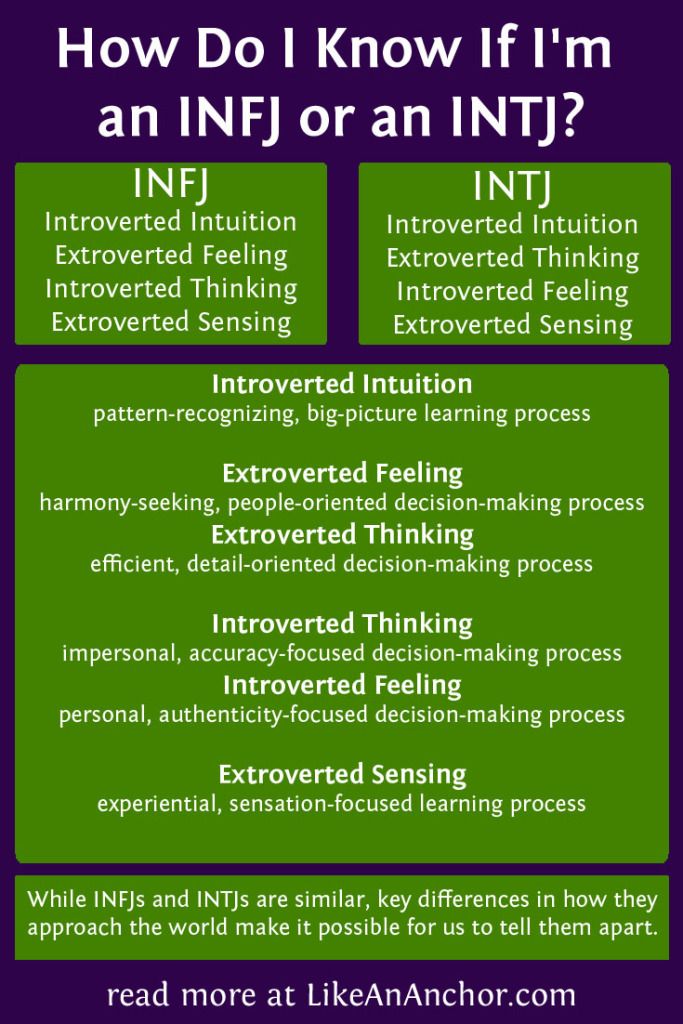 Thus people of this type sweat the details or, at times, omit them. "I've made up my mind, don't confuse me with the facts" could well have been said by an INTJ on a mission. Sensing's extraverted attitude is evident in this type's bent to savor sensations rather than to merely categorize them. Indiscretions of indulgence are likely an expression of the unconscious vengeance of the inferior.
Thus people of this type sweat the details or, at times, omit them. "I've made up my mind, don't confuse me with the facts" could well have been said by an INTJ on a mission. Sensing's extraverted attitude is evident in this type's bent to savor sensations rather than to merely categorize them. Indiscretions of indulgence are likely an expression of the unconscious vengeance of the inferior.
(by Joe Butt and Marina Margaret Heiss - published under license)
INTJ - Introverted Intuitive Thinking Judging - Myers-Briggs
INTJ - Introverted Intuitive Thinking Judging
Have original minds and great drive for implementing their ideas and achieving their goals. Quickly see patterns in external events and develop long-range explanatory perspectives. When committed, organize a job and carry it through. Skeptical and independent, have high standards of competence and performance - for themselves and others.
Common Work Related Strengths
- Ability to focus and concentrate deeply on issues
- ability to see possibilities and implications
- Enjoyment of complex theoretical and intellectual challenges
- Aptitude for creative problem solving
- Determination to reach goals, even in the face of opposition
- Strong motivation to excel
- Ability to work well independently
- High standards and strong work ethic
- Logical and analytical decision-making skills
- Decisiveness and strong organizational skills
Common Work Related Weaknesses
- Loss of interest in projects after creative process has been completed
- Impatience with others who are not as quick
- Difficulty working with or for others considered less competent
- Brusqueness and lack of tact and diplomacy, especially when rushed
- Lack of interest in mundane details
- The tendency not to adequately appreciate and praise others
- Reluctance to reexamine issues already decided
Indeed Career Guide Job Compatibility
Mastermind (INTJ)
INTJs are usually quiet, reserved, and comfortable being alone.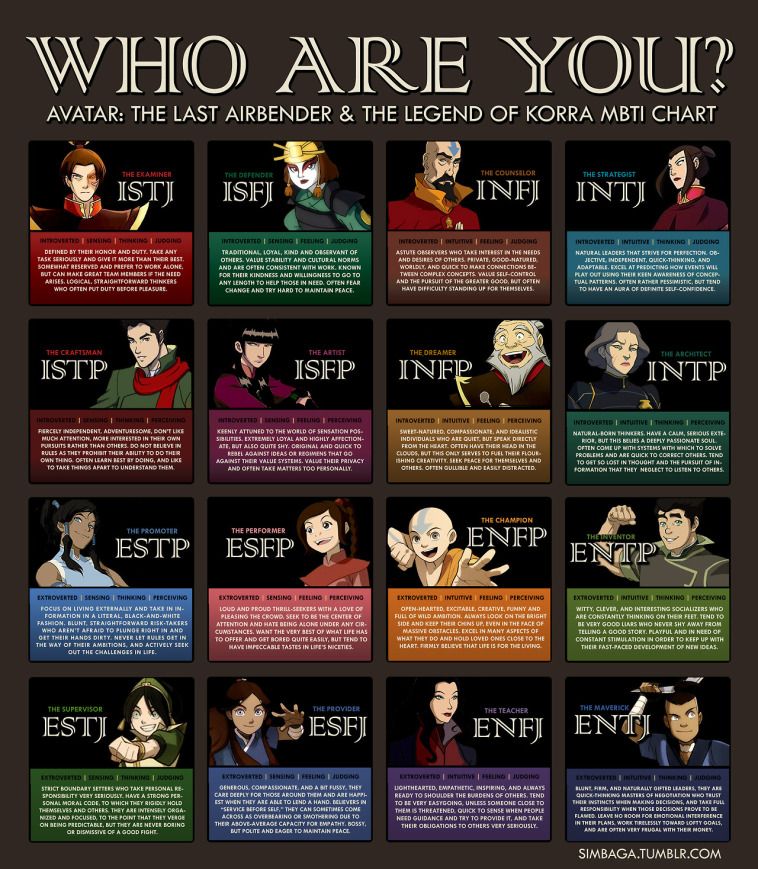 Socializing often drains their energy and they need alone time to recharge. They are interested in ideas and theories and enjoy questioning why things happen the way they do. They excel at planning and strategizing and don’t like uncertainty. They have a talent for recognizing connections that makes them natural problem-solvers and they are skilled at both intuitive and practical thinking. If you an INTJ, some careers you may want to consider are:
Socializing often drains their energy and they need alone time to recharge. They are interested in ideas and theories and enjoy questioning why things happen the way they do. They excel at planning and strategizing and don’t like uncertainty. They have a talent for recognizing connections that makes them natural problem-solvers and they are skilled at both intuitive and practical thinking. If you an INTJ, some careers you may want to consider are:
- Musical performer
- Managing editor
- Photographer
- Financial advisor
- Marketing manager
- Teacher
- Physical therapist
Careers
- Architect
- Business Administrator
- Corporate Strategist
- Computer Programmer
- Computer Specialist
- Dentist
- Doctor
- Entrepreneur
- Engineer
- Freelance Writer
- Judge
- Lawyer/Attorney
- Military Officer
- Manager
- Psychologist
- Researcher
- Scientist
- Software Developer
- Systems Analyst
- Teacher/Professor
- Webmaster
- << Previous: INFJ - Introverted Intuitive Feeling Judging
- Next: ISTP - Introverted Sensing Thinking Perceiving >>
INTJ - frwiki.
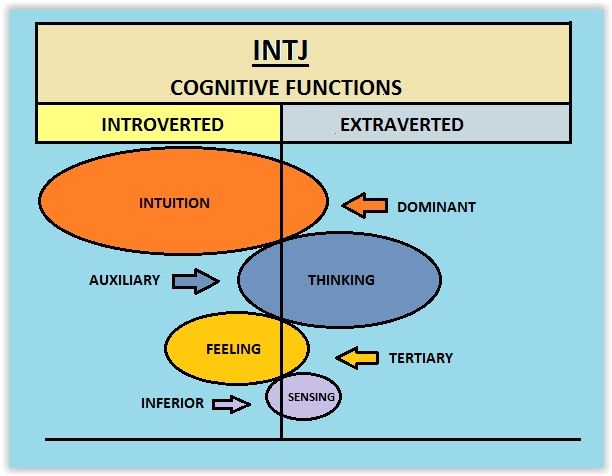 wiki
wiki The psychological type of Myers-Briggs classification is considered in the article. For the socionic type INTj, see Socionics.
INTJ (abbreviation in English "introversion, intuition, thinking, judgment", meaning introversion, intuition, thought, judgment) is an abbreviation used in the context of the Myers Briggs Type Indicator (MBTI) about one of the 16 psychological test types . He is one of the four types belonging to the rational temperament.
INTJ is the second rarest personality type, accounting for about 2% of the population.
Among the NT types, INTJs are the least common. Women with this personality type are very rare (only 0.8% of the population). INTJ females, along with INFJ males, are the least common combination of type and gender.
This psychological type prevails among the gifted.
Summary
- 1 INTJ preference
- 2 Features
- 3 Cognitive functions
- 3.1 Additional functions
- 4 known INTJs
- 5 Notes and references
- 6 Related Articles
INTJ Settings
- I - Introversion , preferred over extraversion: INTJs are usually reserved and reserved.
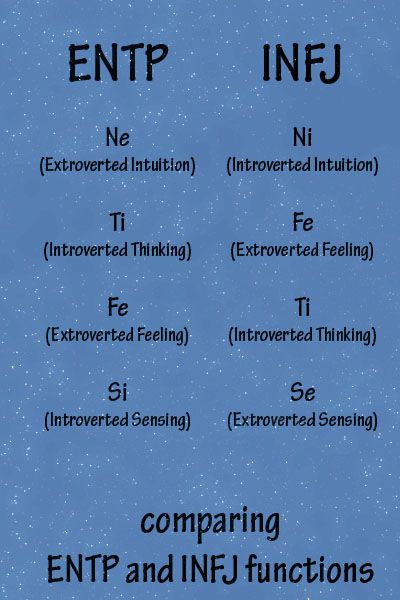 They prefer to hang out with a few close friends than a large circle of acquaintances, and they expend (i.e., lose) energy in socializing (whereas extroverts, under the same circumstances, win).
They prefer to hang out with a few close friends than a large circle of acquaintances, and they expend (i.e., lose) energy in socializing (whereas extroverts, under the same circumstances, win). - N - Intuition , preferable to sensations: INTJs are more abstract than concrete. They focus on the big picture of a thing or situation rather than its details, on the context rather than on the thing itself, on future possibilities rather than immediate realities.
- T - Thinking Preference over Feeling: INTJs place objective criteria over personal preference. When making a decision, they give more weight to logic than to social or emotional considerations.
- J - Judgment , preferable to perception: INTJs plan their activities and make decisions quickly. Their tendency to predict the probabilities of a future situation causes them a certain degree of self-control, which can seem limiting in the eyes of people who prefer perception.
Characteristics
"INTJ (sometimes ruthlessly) apply 'Does it work?' To make judgments about everything around them, from their own research to the prevailing social norms around them.
This way of thinking engenders a rare independence of mind, freeing the INTJ from the constraints of power, convention, or sentimentalism. INTJs are called "system builders" in part because they have an unusual combination of imagination and reliability. The systems that INTJs run on are the INFJ's equivalent of moral reason; they can show both perfectionism and disregard for authority. Intimate relationships, especially romantic ones, can be the INTJ's Achilles' heel. This is partly because INTJs struggle to understand social conventions; However, the biggest problem is that they want people to have meaning . "
INTJ analytical . Like INTPs, they prefer to work alone and are less sociable than most other types. However, an INTJ may take the lead in a group if no one else is willing to do so, or if they detect a major weakness in an already established direction. INTJs are pragmatic, logical and resourceful. Their tolerance for emotionality is usually low; they are insensitive to slogans and have difficulty accepting authority based on tradition, rank or title.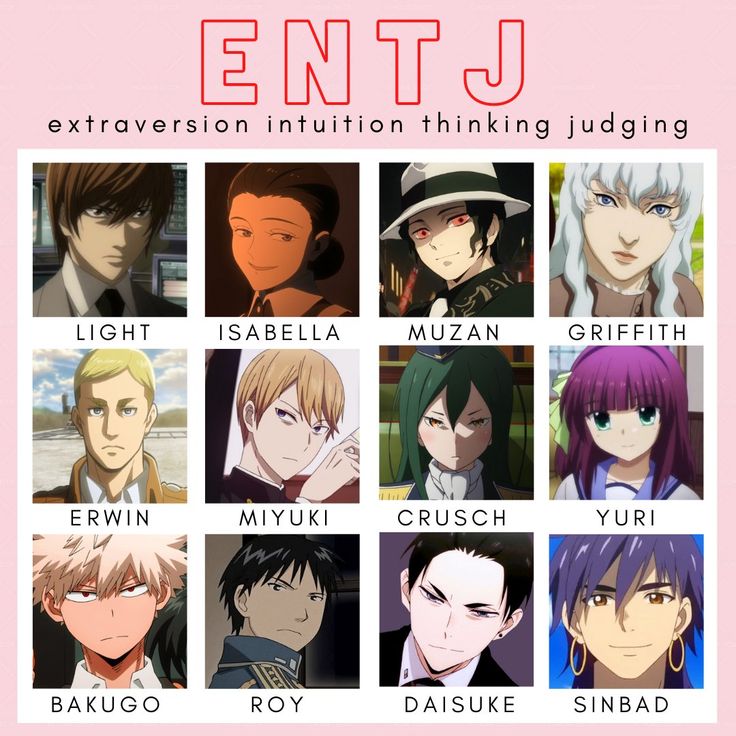
“INTJs are highly individualistic and are constantly looking for new perspectives. They like to discover new ways of understanding things. They are insightful, quick-witted; however, this speed is not necessarily visible from the outside, as they tend to keep the content of their thoughts secret. They have great confidence in their own view of probability, regardless of what others think. We can even consider them the most independent type of the sixteen existing ones. INTJs are in their element when they can calmly and firmly develop ideas, theories, or principles. "
The character of an INTJ mainly includes two traits: independence of mind and a desire for efficiency. They are productive if they are given a certain amount of autonomy and/or creative freedom. They have an innate desire to express themselves by making sense of their own systems of ideas and beliefs, and have a marked talent for analyzing and formulating complex theories. The personality of the INTJ makes them competent in the fields of research, academic or scientific, consulting, management, engineering, and legal.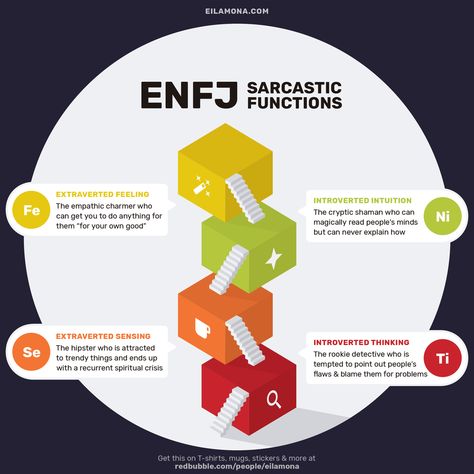 They often have a clear idea of their own knowledge and skills, as well as their limitations and what they are is really not know the quality that distinguishes them from INTPs. This knowledge allows them to develop greater confidence in their abilities and talents, and thus in their ability to lead a group if the need arises.
They often have a clear idea of their own knowledge and skills, as well as their limitations and what they are is really not know the quality that distinguishes them from INTPs. This knowledge allows them to develop greater confidence in their abilities and talents, and thus in their ability to lead a group if the need arises.
When connecting with others, INTJs look for people with similar personality traits and beliefs. An agreement on shared values is a defining element in their relationship. By nature, INTJs may expect others to take the lead and be rational about their relationship. Therefore, they will not always respond to spontaneous infatuation, including from themselves, but rather they will wait for someone who is more in line with their value criteria. They are stable, reliable, focused on what interests them. Harmony in their relationships and in family life is extremely important for them. They usually avoid overly strong passions and do not like to waste time on meaningless social rituals.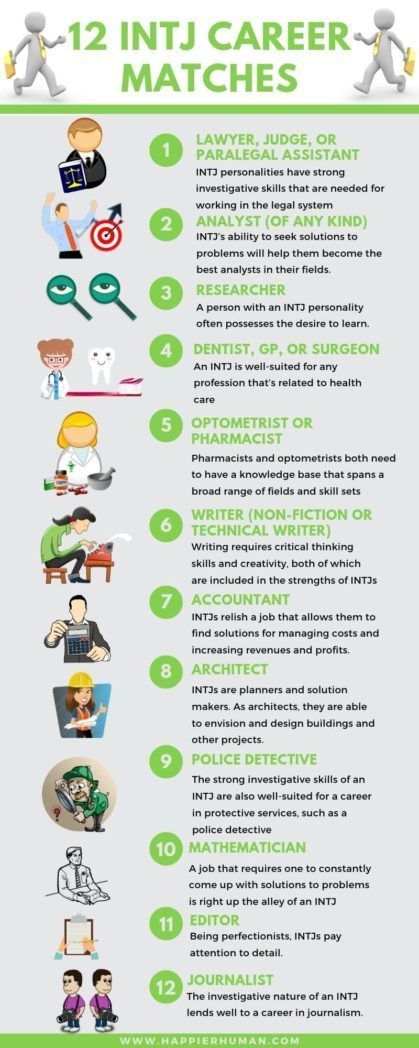 This trait can lead non-INTJs to perceive them as aloof and withdrawn; however, INTJs tend to be very loyal partners, willing to put a lot of time and energy into a relationship they care about to make it work.
This trait can lead non-INTJs to perceive them as aloof and withdrawn; however, INTJs tend to be very loyal partners, willing to put a lot of time and energy into a relationship they care about to make it work.
As friends, INTJs value harmony both at home and in external relationships. When choosing friends, INTJs trust their intuition the most, despite obvious conflicts between them or adverse social pressures. INTJ emotions are difficult to decipher, and neither men nor women of this type tend to express their thoughts or feelings as emotional reactions. They can appear cold, reserved, and even insensitive, although they are very sensitive to signals of rejection from those they care about. In social situations, INTJs may also be oblivious to small rituals designed to keep everyone calm. For example, they generally consider "small talks" like conversations to be a waste of time. In interpersonal relationships, INTJs tend to do better at work than at play.
According to psychologist David Keirsey, INTJs “understand the logical implications of each step and readily understand how each step requires or entails the next.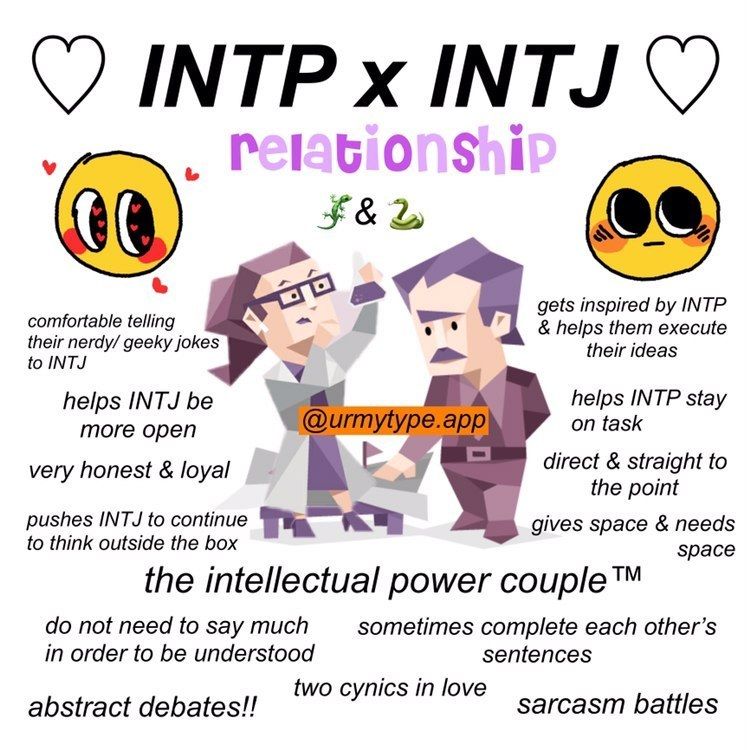 They make plans for every eventuality that is bound to happen. They see the forest through the trees and foresee systemic errors in a complex project. With an extremely objective view of these pragmatists, it is not easy to shake emotions, hopes, luck or chance. The brains always have a plan A in mind, but are always ready to move on to plans B, C, or D. "Kirsi Adds to INTJ" Every plan has a purpose and every step has a reason. The order is never arbitrary - every detail must have a conscious strategic intent if it is to be included in the main design. At the same time, they are highly adaptive and always ready to change course if new factors are introduced. Plans are never set in stone, as they are always in need of improvement. The brain is not interested in ideas for its own good, but in ideas for their use and usefulness in reality. "
They make plans for every eventuality that is bound to happen. They see the forest through the trees and foresee systemic errors in a complex project. With an extremely objective view of these pragmatists, it is not easy to shake emotions, hopes, luck or chance. The brains always have a plan A in mind, but are always ready to move on to plans B, C, or D. "Kirsi Adds to INTJ" Every plan has a purpose and every step has a reason. The order is never arbitrary - every detail must have a conscious strategic intent if it is to be included in the main design. At the same time, they are highly adaptive and always ready to change course if new factors are introduced. Plans are never set in stone, as they are always in need of improvement. The brain is not interested in ideas for its own good, but in ideas for their use and usefulness in reality. "
According to the official MBTI guidelines, INTJs of all types consistently achieve the highest IQs.
Cognitive functions
According to the latest developments, the INTJ cognitive functions are formulated as follows:
- Dominant
- introverted intuition (Ni)
- Attracted by symbolic techniques or actions, introverted intuition controls the synthesis of pairs of opposites, creating new images in the mind.
 From these achievements comes a certain form of certainty that requires action or experience in order to develop a possible vision of the future; such realizations may include complex systems or universal truths.
From these achievements comes a certain form of certainty that requires action or experience in order to develop a possible vision of the future; such realizations may include complex systems or universal truths. - Auxiliary
- extraverted thinking (Te)
- Extraverted thinking organizes and plans ideas to ensure effective and productive achievement of set goals. It looks for logical explanations for actions, events, and conclusions and identifies possible errors or misconceptions.
- Tertiary
- introverted feeling (Fi)
- Introverted moods filter information from value interpretations, forming judgments according to often intangible criteria. This function constantly balances between two different imperatives, such as the pursuit of harmony and the pursuit of authenticity. Adapted to subtle differences, the introverted sense instinctively senses what is right or wrong in a given situation.
- Below
- extraverted sensation (Se)
- Extraverted sensation focuses on experiences and sensations of the physical and immediate world.
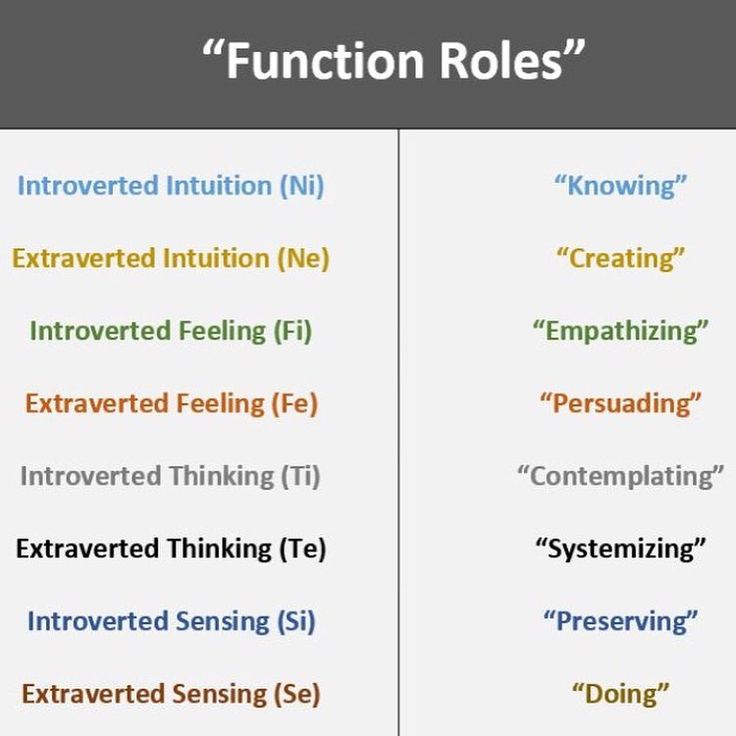 Equipped with a keen awareness of what surrounds a person, it gives him facts and details that can constitute the engine of spontaneous action.
Equipped with a keen awareness of what surrounds a person, it gives him facts and details that can constitute the engine of spontaneous action.
Secondary Functions
According to recent developments, in particular the work of Linda W. Behrens, these four additional functions are not those that INTJs naturally tend to, but can develop under stress. For INTJ, these functions are structured as follows:
- Extraverted Intuition (Ne) : Extraverted Intuition finds and interprets the hidden meaning of an object, statement, or situation based on the question "what if...?" “Explore possible alternatives and combine several possibilities. This game of imagination weaves a web of experience and understanding to form a new big picture that can act as a catalyst for action.
- Introverted Thinking (Ti) : Introverted thinking strives for precision, such as the correct word, to accurately express an idea. She notices the tiny differences that define the essence of things, then she analyzes them and classifies them.
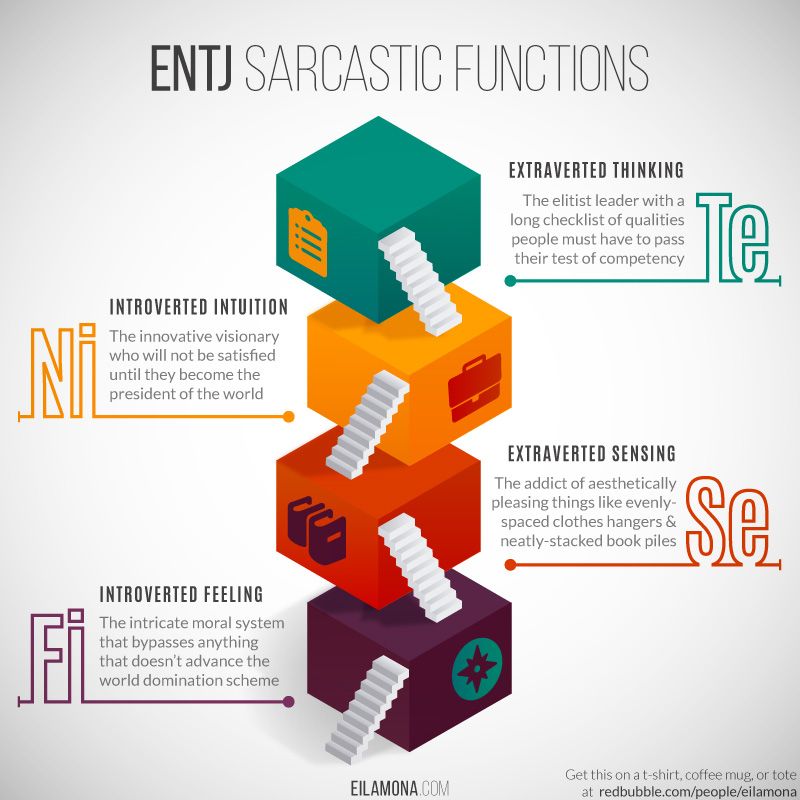 Introverted thinking looks at the situation from all angles, seeks to solve problems with a minimum of effort and risk. He uses models to correct the hesitation and inconsistency of logical reasoning.
Introverted thinking looks at the situation from all angles, seeks to solve problems with a minimum of effort and risk. He uses models to correct the hesitation and inconsistency of logical reasoning. - Extraverted Sense (Fe) : Extraverted Sense seeks social connections and creates harmonious interactions through polite and adaptive behavior. It responds to the explicit (and implicit) desires of others, which can cause internal conflict between the subject's own needs and the desire to satisfy or understand the needs of others.
- Introverted Sensing (Si) : Introverted Sensing collects data from the present moment and compares it with data from past experience. This process brings to the surface the feelings associated with the memories that the subject experiences while remembering them. Seeking to protect what is familiar to it, introverted sensation brings out goals and expectations in history for future events.
Notable INTJs
Although it is only by passing the MBTI test that a person's type can be identified with certainty, several practitioners have attempted to determine the type of certain famous people from biographical information.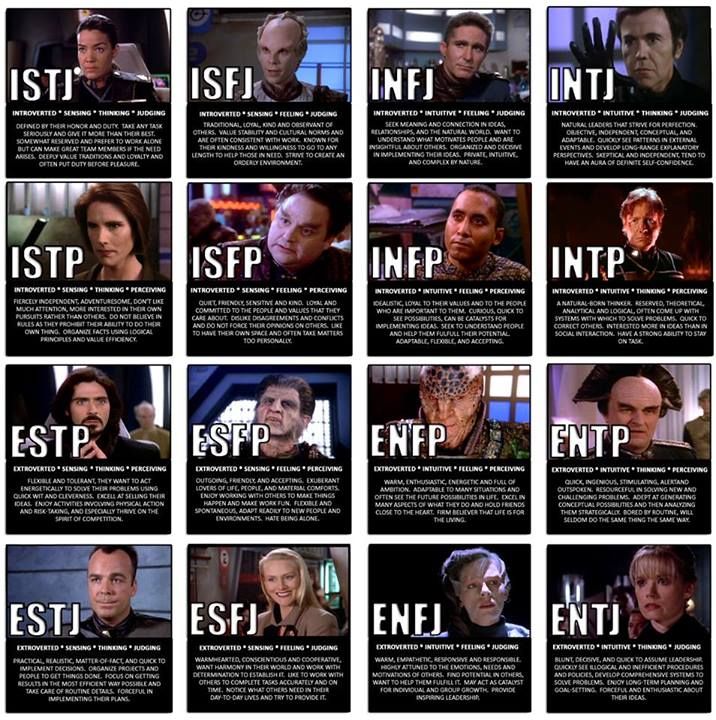 Here is a list of individuals identified as INTJs.
Here is a list of individuals identified as INTJs.
-
Heraclitus, Greek philosopher.
-
Isaac Newton, British mathematician and physicist.
-
Jane Austen, English writer.
-
Friedrich Nietzsche, German philologist and philosopher.
-
Ayn Rand, American philosopher and rationalist writer.
-
Susan Sontag, American author and novelist.
-
Edward Said, Palestinian-American scholar, post-colonial literary theorist.
-
Bobby Fischer, American chess player.
-
Paul Krugman, American economist.
-
Jodie Foster is an American actress, director and producer.
-
Elon Musk, South African engineer and entrepreneur.
-
Judit Polgár, Hungarian known as the "queen of chess", a great international chess master at the age of fifteen.
-
Christopher Nolan, director, screenwriter, editor and producer of British American cinema.
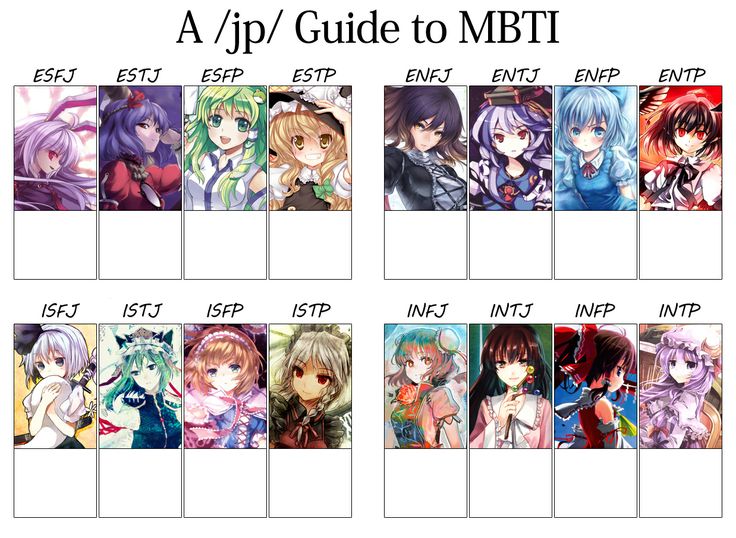
-
Charles de Gaulle, President of the French Republic on V - and Republic.
-
G.F. Hegel, German philosopher.
-
Mark Zuckerberg, computer scientist, American business leader, CEO of Facebook.
-
John Maynard Keynes, English economist.
-
Stephen Hawking, British physicist and cosmologist.
-
Lance Armstrong, American cyclist.
Click a thumbnail to enlarge it.
Notes and links
- ↑ " The Personality" Architect "(INTJ) ", at 16Personalities (accessed February 24, 2021) .
- ↑ " Myers-Briggs Foundation: 16 Types of MBTI " (accessed May 7, 2009) .
- ↑ " Myers Briggs Fund " (accessed at 1 - th January 2014) .
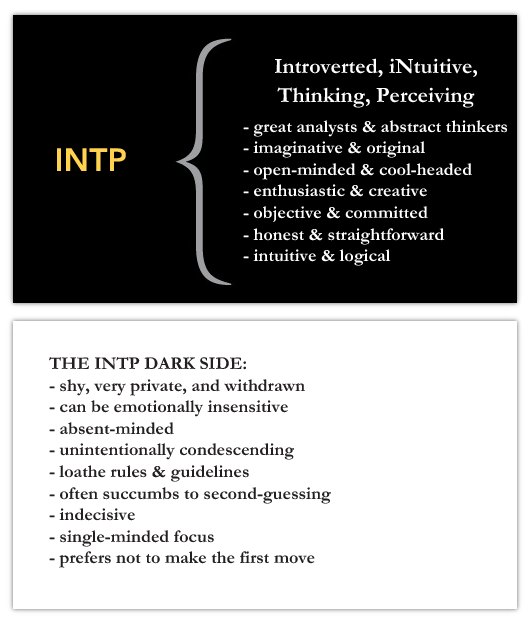
- ↑ " Mind Change: Extraversion vs. Introversion " (as of January 10, 2009)
- ↑ " Changing Minds: Feeling vs. Intuiting " (As of January 10, 2009)
- ↑ " Changing Perspectives: Thinking vs. Feeling " (as of January 10, 2009)
- ↑ " Changing Views: Judgment vs. Perception " (As of January 10, 2009)
- ↑ Marina Margaret Heiss, " Introverted intuitive thinking, judgment » , .
- ↑ (in) Sandra Krebs Hirsch and Jean Kummerow, An Introduction to Fonts in Organizations: A Personal Interpretation Guide , Palo Alto, CA. : Consulting Psychologists Press, .
- ↑ (in) " Learn about the Rational Mastermind " (accessed February 24, 2021) , "The Rational INTJ Mastermind".
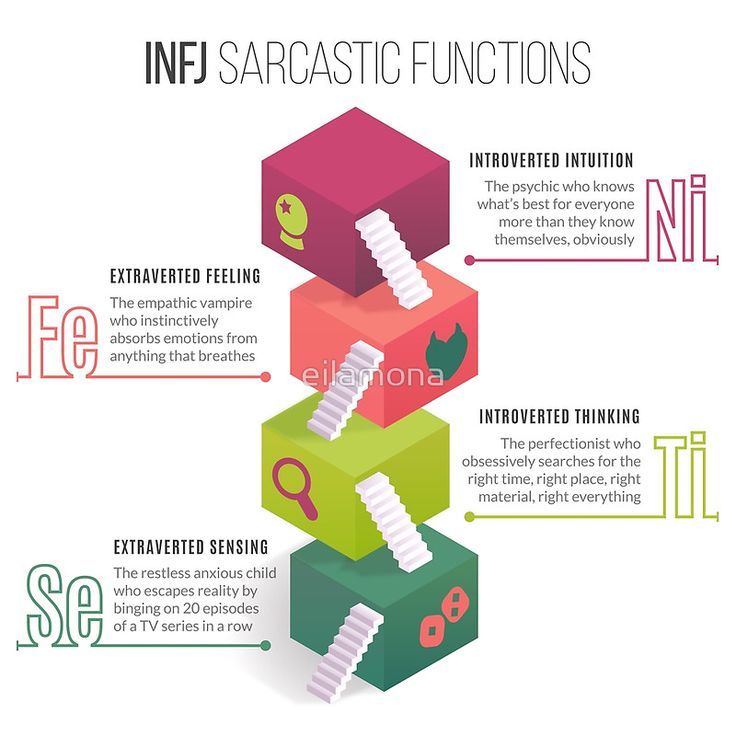
- ↑ (c) " Learning Styles for Each Personality Type Myers-Briggs ", (accessed at 1 - e January 2014) "The Learning Style 26."
- ↑ (ru) Barron-Teeger, Barbara; Teager, Paul D., Do What You , : Discover Your Ideal Career Through the Secrets of Personality Type : Boston, Little, Brown, , 2- e ed. , 350 p.
 .
. - ↑ " Cognitive Processes: Introverted Intuition " (Viewed May 12, 2009) .
- ↑ " Cognitive Processes: Extraverted Thinking " (Viewed May 12, 2009)
- ↑ " Cognitive Processes: Introverted Feeling " (accessed May 12, 2009g.)
- ↑ " Cognitive Processes: Extraverted Perception " (Viewed May 12, 2009)
- ↑ " CognitiveProcesses.com " (accessed May 21, 2008)
- ↑ " Cognitive Processes: Extraverted Intuition " (Viewed May 12, 2009)
- ↑ " Cognitive Processes: Introverted Thinking " (Viewed May 12, 2009)
- ↑ " Cognitive Processes: Extraverted Feeling " (accessed May 12, 2009)
- ↑ " Cognitive Processes: Introverted Perception " (accessed May 12, 2009)
- ↑ a b c d and e (in) " Known INTJ " on IDRlabs (accessed February 24, 2021) .
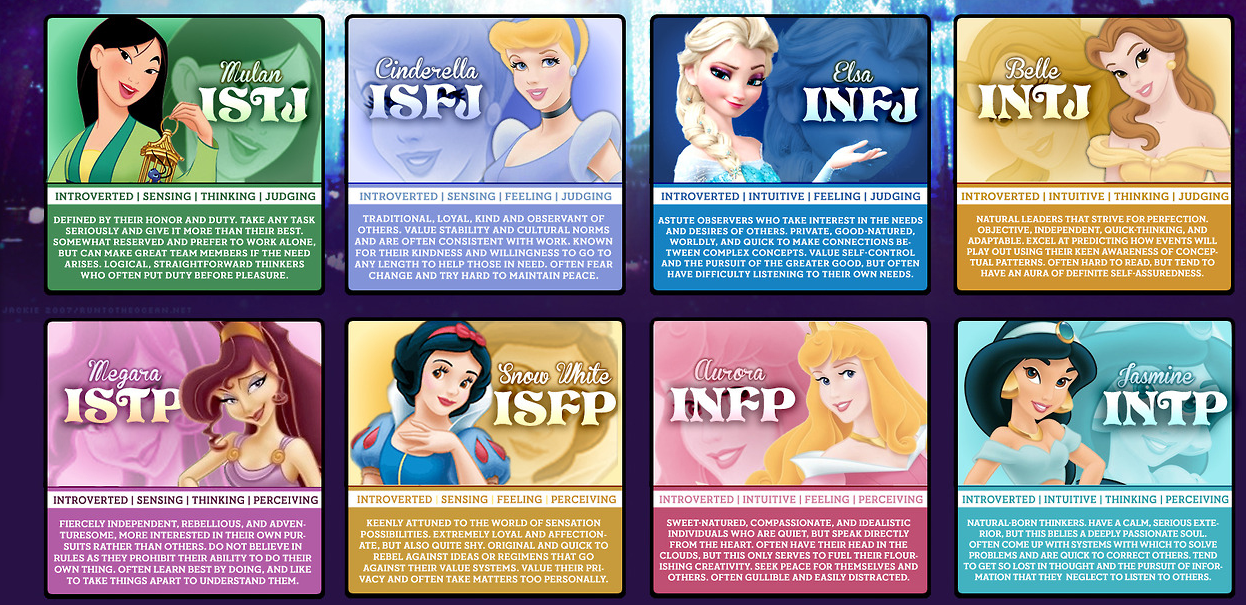
- ↑ (en) Bill McEnney, " Lance Armstrong - INTJ 9 interview0233" on Prelude Character Analysis (accessed February 25, 2021) .
Related Articles
- Myers-Briggs Indicator
- Psychological type
- Psychological temperaments
- Carl Jung
| Myers-Briggs Indicator | |
|---|---|
| Theory |
|
| Personalities |
|
| Concepts |
|

INTJ PERSON | MBTI TYPE
In 2% of the population INTJ is among the rarest species.'>
In 2% of the population INTJ is among the rarest species.
Personality INTJ
Engineer/Architect/Inspirer
[dropcap] I [/ dropcap] NTJ stands for (I) introverted (N) intuitive (T) thinking (J) judgment. They represent the preferred cognitive functions used by this personality type. The INTJ cognitive stack looks like this:
- Dominant - Introvert intuition (NI)
- Auxiliary - extrovert thinking (those)
- Tertical feeling (FI) Lower - Extrovert perception INTJ:
- Excellent planner
- preserves self -control under a pressure of
- Excellent solutions to
- Persistent and thorough 900
- obligations
- Return and Stabilly Certen Forward thinking
- Creative
- Self-confident and responsible
- Hardworking
- Helping confidence
- Very condemning
- do not want to adapt to sudden changes
- Criticism 900
- Effly NARSISISISISISS AND NAREMIRIA Excessively closed and withdrawn
- Suspicious of others
- Distrustful
- Emotionally disabled
- Cynicism
- Depression
Introverted Intuition (Ni) - Introverted Intuition is a perceptual function associated with abstract interpretation and the search for patterns.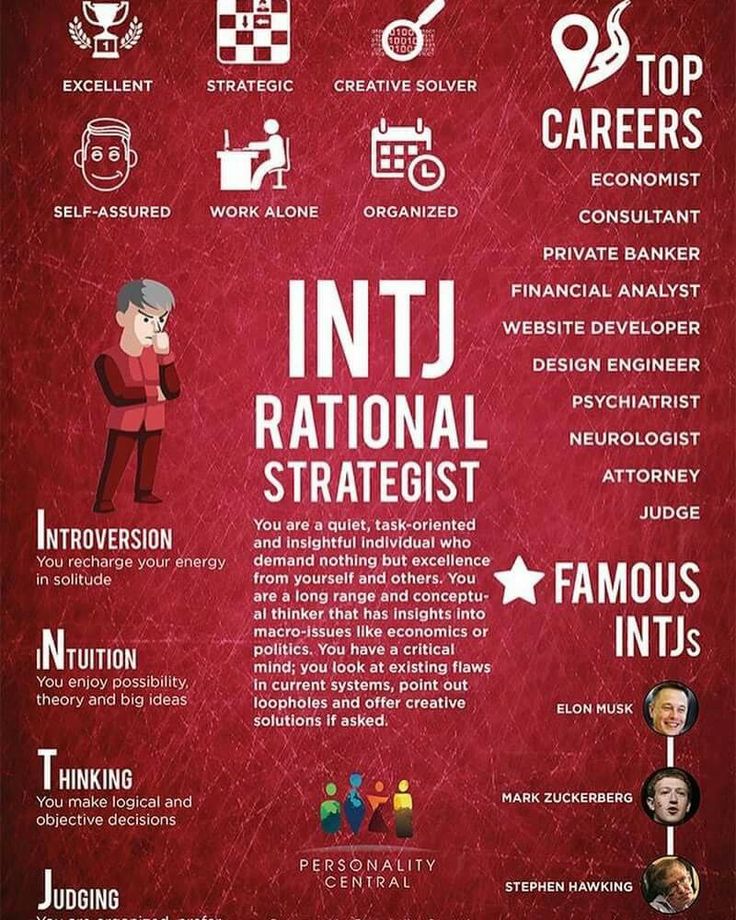 It is predictive and focuses on reading the underlying subtext and meaning of things and events beyond what is physically and concretely obvious. This concerns the likely outcomes, the interpretation of meaning, and the future.
It is predictive and focuses on reading the underlying subtext and meaning of things and events beyond what is physically and concretely obvious. This concerns the likely outcomes, the interpretation of meaning, and the future.
Extraverted Thinking (Te) - Extraverted thinking is a function of judgment that organizes information into physical or metasystems as well as into visual graphs and diagrams. It applies logic and proven concepts to the execution or maintenance of some project or goal. It focuses on testing, analysis, strategizing, and problem solving. Extraverted thinking optimizes efficiency and identifies weaknesses that need to be improved.
Introverted Feeling (Fi) - Introverted Feeling is a function of judgment related to subjective assessments of good and bad, right and wrong. It develops personal integrity and a unique creative temperament. Introverted feeling may appear self-centered and anti-social and may rebel against the expectations of prevailing social norms.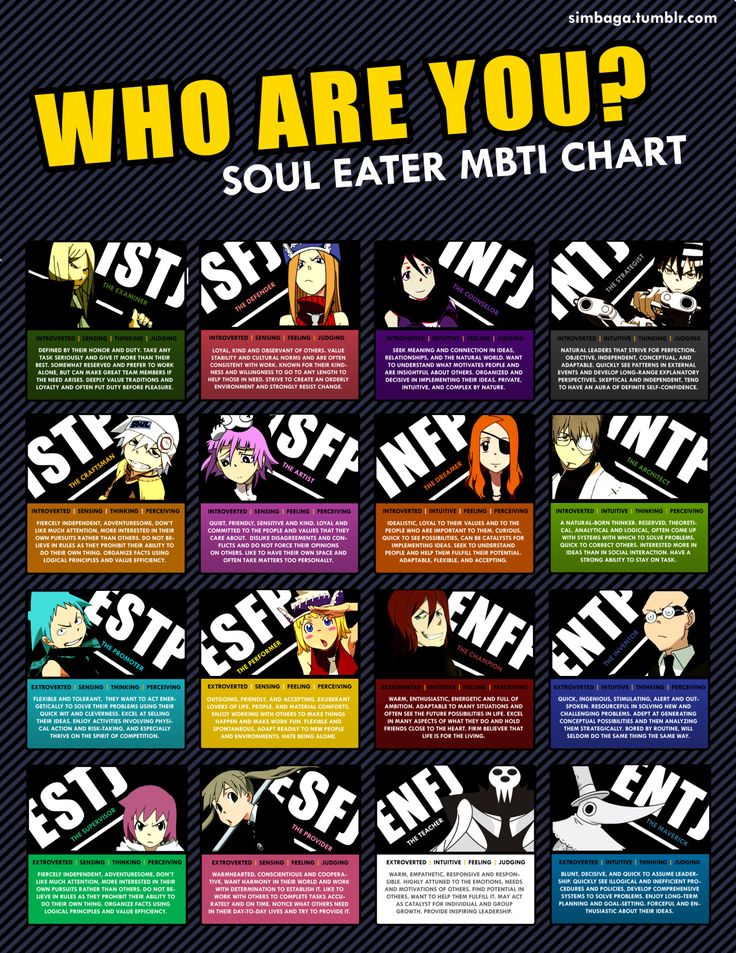 Fi wants to be true to himself and resists the imposition from the outside against his will. It is also compassionate self-sacrifice with a noble desire to do what is considered right.
Fi wants to be true to himself and resists the imposition from the outside against his will. It is also compassionate self-sacrifice with a noble desire to do what is considered right.
Extraverted Perception (Se) - Extraverted Perception is a perceptual function that is highly aware of the details of the physical environment. (Se) is experiential and sensation-focused. He is impulsive, instantaneous, highly reactive, responsive and action oriented. Extraverted perception is related to phenomena and everything that can be directly experienced through the senses.
About INTJ Persona
In the Keirsey temperament sorter, INTJs belong to the group that Keirsey called rational. This group is one of four classifications into which he divided the 16 personality types. The Rationals are made up of INTP, ENTP, INTJ, and ENTJ. AT INTJ personality among the rarest types in MBTI. It makes up only 2% of the total population with INTJ women even rarer - 1% of the female population.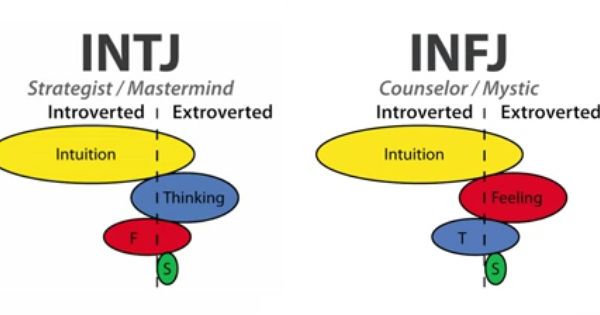 Their scarcity ensures the status of intelligent exceptions; a type of personality that often finds itself in conflict with the prevailing views and prevailing mores of society. INTJs can be narcissistic and tend to be highly judgmental of what they see as idiotic and pointless. They can be harsh and very critical of others, but usually have a number of virtuous qualities that give them an aura of sophistication, mystery, and nobility.
Their scarcity ensures the status of intelligent exceptions; a type of personality that often finds itself in conflict with the prevailing views and prevailing mores of society. INTJs can be narcissistic and tend to be highly judgmental of what they see as idiotic and pointless. They can be harsh and very critical of others, but usually have a number of virtuous qualities that give them an aura of sophistication, mystery, and nobility.
INTJ people prefer a structured lifestyle to a wandering, unpredictable and unstable one. These are world-class planners who like to think ahead and prepare ahead of time. Deadlines are taken seriously and they will develop a realistic attack plan to ensure that their task or goal is completed on time. INTJs develop excellent strategic skills over time, which allows them to become highly effective at what they do. They are able to become masters in many areas, wherever they focus their energy and attention. They have the focus and cunning of a grandmaster, and indeed the legendary chess champion Bobby Fischer was known as an INTJ.
The high achievement and ambition of the INTJ types make them build their future for years to come. They have an uncanny foresight that allows them to set in motion those things that will bring them success in the future. They are often viewed by others as highly intelligent, academically prone to success, and tend to be overrepresented among those who value IQ highly. tests. Their thought processes are very intuitive and far-sighted. INTJ often form hunches and ideas that turn out to be correct after a series of tests and studies. They are like scientists with a bit of visionary mysticism thrown in. They often don't know exactly where their ideas come from. Perhaps they are transmitted from a higher power or from a demonic one (just kidding). Once these ideas take shape in their minds, INTJs are forced to look for the means to validate them and give them life, and this is often what drives and occupies INTJs' time.
INTJ s embody many contradictions.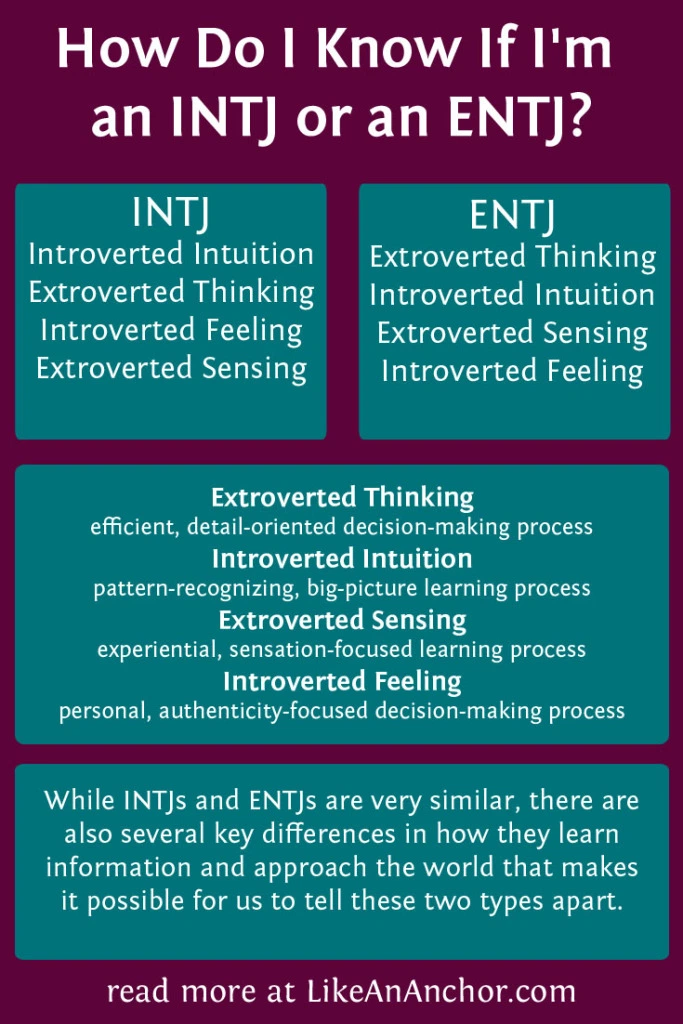 They are both cynical and idealistic; robotic but sensitive. These are mysterious individuals who live in their minds, analyzing possibilities that do not even match with other types. INTJs do it in an almost magical, supernatural way. They are very introverted, introverted and aloof personalities. Others may see INTJs as arrogant and cold. They are introverted, not emotional, and not inclined to put their feelings on public display. They would rather let others believe that they have no emotions, but they know that this is not the case at all. INTJs don't focus on feelings, but they know how they feel. They simply choose not to act on those feelings in the moment, preferring to analyze them later and reflect on why they feel the way they do so that they can come to a rational verdict about it.
They are both cynical and idealistic; robotic but sensitive. These are mysterious individuals who live in their minds, analyzing possibilities that do not even match with other types. INTJs do it in an almost magical, supernatural way. They are very introverted, introverted and aloof personalities. Others may see INTJs as arrogant and cold. They are introverted, not emotional, and not inclined to put their feelings on public display. They would rather let others believe that they have no emotions, but they know that this is not the case at all. INTJs don't focus on feelings, but they know how they feel. They simply choose not to act on those feelings in the moment, preferring to analyze them later and reflect on why they feel the way they do so that they can come to a rational verdict about it.
INTJs are confident and generally care little about what they think. They often do not fully understand how others perceive them, but public recognition in any case does not have much personal meaning for them.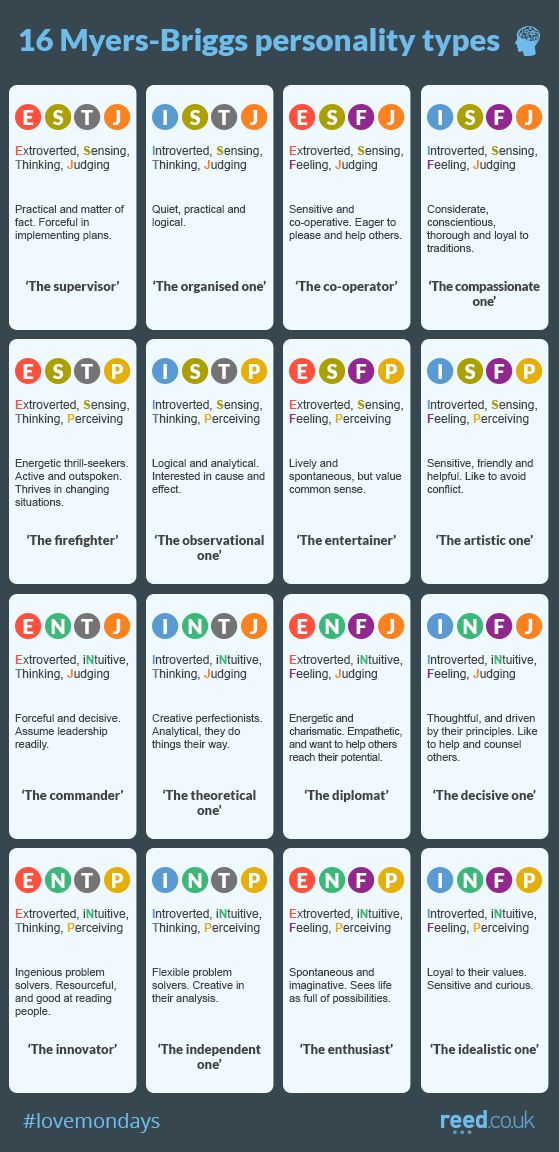 Mature INTJs eventually learn to fit in a bit and play social songs and dances, realizing this as a means to achieve their goals and ambitions within society. INTJs can appear outgoing and outgoing, and when they do, people are often very responsive. INTJs prefer to talk about ideas, especially their own ideas and thought processes. They like people who share their interest in the unusual and are future-oriented. INTJs get along best with other rational types and idealists who prefer intuition over sensation.
Mature INTJs eventually learn to fit in a bit and play social songs and dances, realizing this as a means to achieve their goals and ambitions within society. INTJs can appear outgoing and outgoing, and when they do, people are often very responsive. INTJs prefer to talk about ideas, especially their own ideas and thought processes. They like people who share their interest in the unusual and are future-oriented. INTJs get along best with other rational types and idealists who prefer intuition over sensation.
INTJs pride themselves on their intelligence and competence, and this is primarily what they judge others by. They are not impressed by such signs of authority as rank and superficially fabricated titles. The INTJ will criticize anyone they deem incompetent and stupid, no matter what rank or title they hold. An INTJ person tends to be laconic and concise, but often has an extensive vocabulary. Sometimes they have to soften the way they speak to fit the person they are talking to.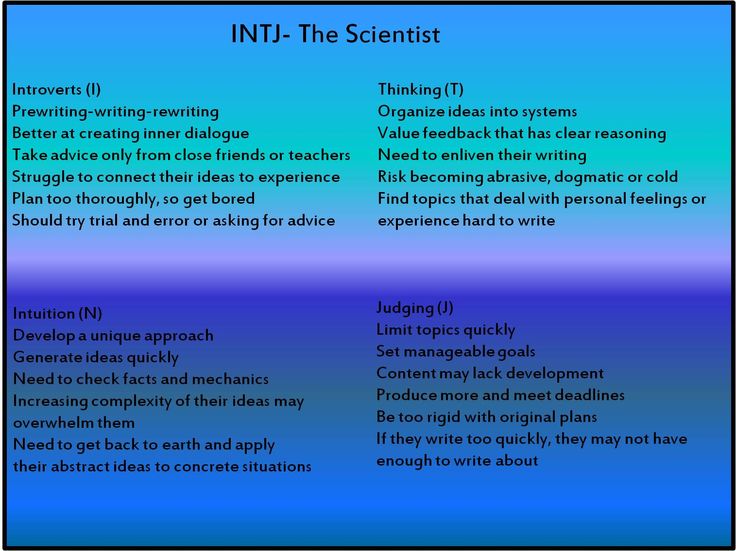 INTJs can be too vague and verbose to be clearly understood by other types, and this contributes to INTJs feeling misunderstood and alone. If someone can't understand them, INTJs can blame them. In many cases, they would rather not bother talking to these people at all and would rather go further than try to "mute" their communication to accommodate an unprepared listener...if they really don't like them.
INTJs can be too vague and verbose to be clearly understood by other types, and this contributes to INTJs feeling misunderstood and alone. If someone can't understand them, INTJs can blame them. In many cases, they would rather not bother talking to these people at all and would rather go further than try to "mute" their communication to accommodate an unprepared listener...if they really don't like them.
Leadership INTJ
INTJs solve problems creatively. The essence of any approach: will it work? They care about practical efficiency and effectiveness, not tradition and orthodoxy. INTJs are great for building systems that optimize performance. For this reason, they make excellent managers and leaders in many areas. While they are well suited to be leaders, they are often not forced to do so unless they perceive the current leadership as incompetent, in which case the INTJ will be motivated to intervene and seize control of the ship so they can correct course.
INTJs lead with visionary thinking. They are very capable of realizing their lofty and ambitious personal goals. Once they have defined their mission, they will begin to complete it, like the ruthless Captain Ahab on his obsessive pursuit of a white whale. INTJs keep the big picture in mind and are armed with vast knowledge and data so they have the technical know-how to put the pieces of their puzzle together. INTJs are goal oriented, and the attention and energy they put into thinking and researching is rarely for its own sake in the same way that it is for INTPs. They do this with a goal in mind or a specific goal they want to achieve, whether it be short term or long term.
Others tend to respect or even fear INTJs. They carry themselves with respect and dignity, but their enigmatic nature can often cast doubt on their motives. Why is he/she so aloof? Does he/she think they are better than us? Is he/she plotting to destroy us all? The INTJ type, like many introverts, inevitably becomes the target of negative introvert stereotypes, such as the quiet lone wolf who one day shoots up his school without warning.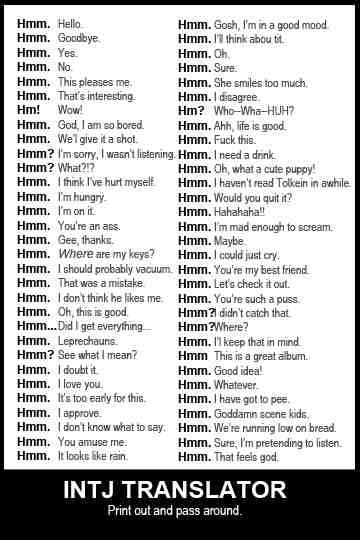 INTJs can also get a bad rap for being particularly devious and mephistopheles. In fiction, they are often referred to as an evil genius who seeks to destroy or rule the world. In fact, INTJs are some of the most admirable and honorable people out there, including the likes of Elon Musk and Mark Zuckerberg, two individuals who have achieved great success through their innovation and their life's work.
INTJs can also get a bad rap for being particularly devious and mephistopheles. In fiction, they are often referred to as an evil genius who seeks to destroy or rule the world. In fact, INTJs are some of the most admirable and honorable people out there, including the likes of Elon Musk and Mark Zuckerberg, two individuals who have achieved great success through their innovation and their life's work.
INTJ Staff
INTJ staff members are interested in understanding the basic principles and mechanisms at work in the world so that they can apply them to their own projects and endeavors. They have high standards, considerable willpower, and discipline that show through in the work they do. The INTJ person loves the challenge and the challenge of figuring things out until they get the hang of it. Simple tasks are boring to them, they require variety and intellectual stimulation from work. INTJs are highly independent and work best on their own in a structured environment with clear goals.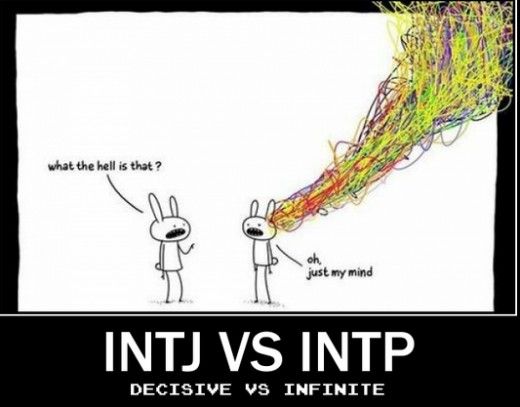 They dislike a noisy, chaotic workplace and prefer a quiet environment where they can concentrate. They are diligent, reliable and trustworthy workers who work best when they are given sufficient freedom and autonomy.
They dislike a noisy, chaotic workplace and prefer a quiet environment where they can concentrate. They are diligent, reliable and trustworthy workers who work best when they are given sufficient freedom and autonomy.
INTJs tend to be very good at managing their time. They are punctual and well aware of how much time and work is required to complete the task. They can be trusted to carry out their duties with diligence and professionalism, and they respect others who do the same. While INTJs are willing to act from a subordinate position and take orders from their superiors, they are not inclined to blindly follow the directions of others. First of all, they think for themselves and are critical of everything that is required of them. INTJs refuse to be lemmings and are determined to be true to who they are and what they represent. They expect the same from others because they understand that all people are fallible and that not all people in leadership positions are necessarily qualified to be there.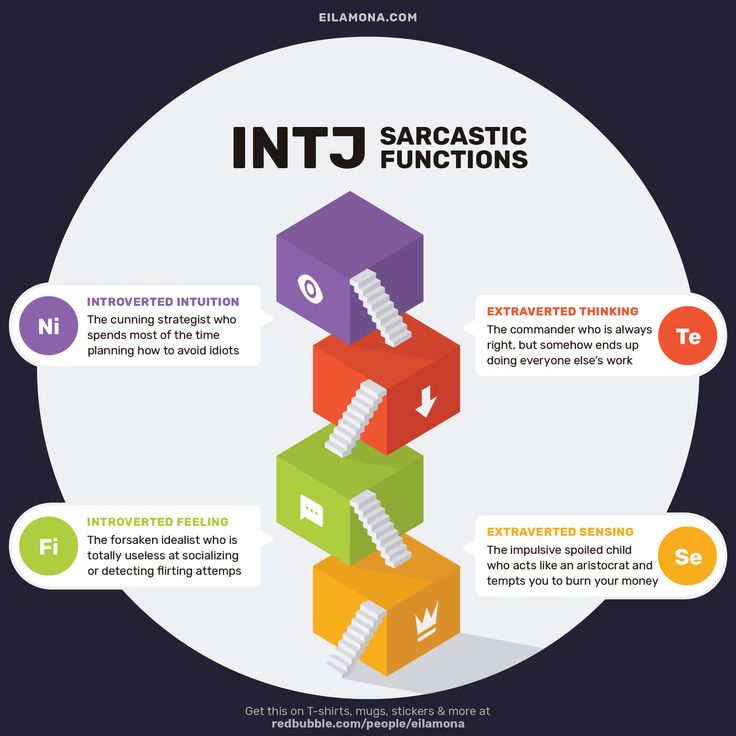 People, regardless of their rank or rank, will be judged on the merit of their ability and character.
People, regardless of their rank or rank, will be judged on the merit of their ability and character.
INTJs may get into arguments and become uncooperative when they feel they are losing control of their area or not getting the respect they think they deserve. In terms of argumentation, INTJs are second only to ENTJs. In them, everything is questioned and re-evaluated, and they are not inclined to adhere to meaningless customs. At times they may disregard social niceties and will not apologize for their disdain for Schmoozers and superficial Hobbobbers who have no essence in their minds. They are open to new ideas as long as they are backed by logic, but they are not fans of the procedures in the book, which do not allow for creative improvement or better alternatives.
INTJ and religion
INTJ are the least likely of all MB types to believe in a religious higher power. However, as it turns out, many INTJs are genuinely interested in spirituality, both orthodox and non-orthodox.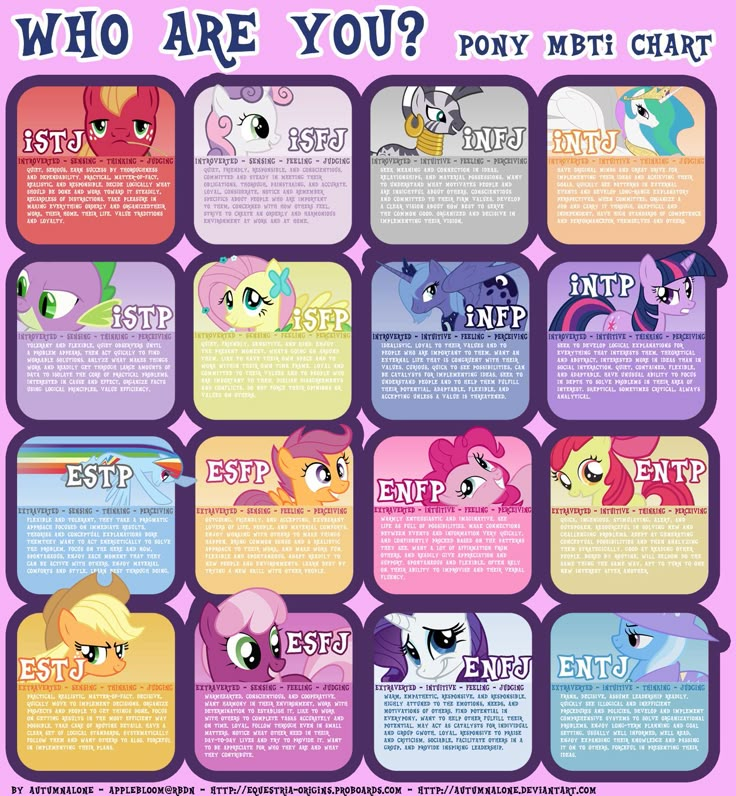 Sir Isaac Newton, father of physics and calculus and famed INTJ, is reported to have been very religious and superstitious. He was also known to be paranoid and short-tempered. It would make sense for INTJs to show some interest in the ethereal realm of spirituality due to their introverted intuition. Nor would be inclined to interpret the meaning of events on a symbolic and metaphysical level. There are many things in the world that cannot yet be explained, and for many things the possibility of a god still remains on the table. Nee doesn't always get it right, and sometimes INTJ connects dots that shouldn't be connected. At worst, they can become like conspiracy theorists who buy into intriguing but unsubstantiated theories as if they were empirical fact. This is why extraverted thinking is important for fact checking and edifying the intuitive mental shenanigans that INTJs come up with.
Sir Isaac Newton, father of physics and calculus and famed INTJ, is reported to have been very religious and superstitious. He was also known to be paranoid and short-tempered. It would make sense for INTJs to show some interest in the ethereal realm of spirituality due to their introverted intuition. Nor would be inclined to interpret the meaning of events on a symbolic and metaphysical level. There are many things in the world that cannot yet be explained, and for many things the possibility of a god still remains on the table. Nee doesn't always get it right, and sometimes INTJ connects dots that shouldn't be connected. At worst, they can become like conspiracy theorists who buy into intriguing but unsubstantiated theories as if they were empirical fact. This is why extraverted thinking is important for fact checking and edifying the intuitive mental shenanigans that INTJs come up with.
Death gaze
An INTJ has a gaze that is often referred to as "death gaze" or "death gaze".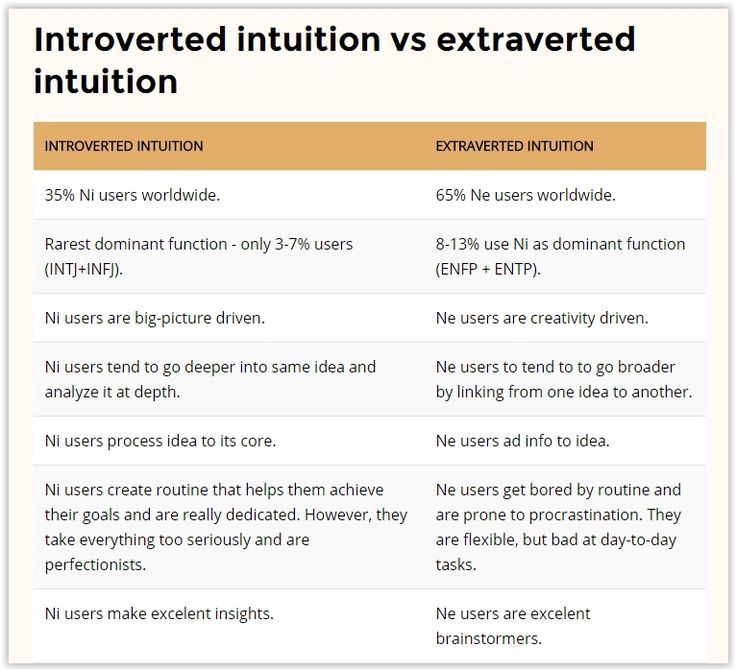 This serious and thoughtful facial expression is characterized as vaguely threatening and intimidating to others. INTJs often project flat affect, with little to no emotion showing on their face. Basically, it's a "vacation bitch" that can make them seem more miserable or unfriendly than they really are. In most cases, there is no malice behind this expression, although people tend to misinterpret it as such. INTJs, lost in their thoughts, forget their surroundings and look into the distance where no one sees. If someone is standing in his line of sight, the INTJ may appear to be looking directly at him. Because they are so fascinated by the intensity of their thoughts, INTJs may not be aware of how their continuous stare can disturb or disturb others.
This serious and thoughtful facial expression is characterized as vaguely threatening and intimidating to others. INTJs often project flat affect, with little to no emotion showing on their face. Basically, it's a "vacation bitch" that can make them seem more miserable or unfriendly than they really are. In most cases, there is no malice behind this expression, although people tend to misinterpret it as such. INTJs, lost in their thoughts, forget their surroundings and look into the distance where no one sees. If someone is standing in his line of sight, the INTJ may appear to be looking directly at him. Because they are so fascinated by the intensity of their thoughts, INTJs may not be aware of how their continuous stare can disturb or disturb others.
The strengths of INTJ
The weaknesses of INTJ
INTJ Parenting
As parents, INTJs will be strict and not overly affectionate with their children.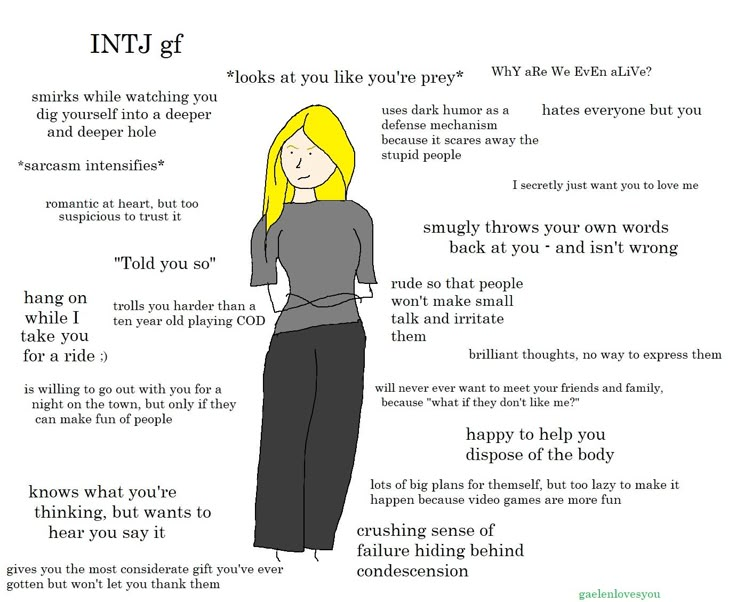 Although they may love their children intensely, they may not express it openly. The loyalty of INTJs can be seen in the strength and tenacity with which they protect their children, or in the sacrifices they make for their safety and best interests. They will try to instill the values they value most, such as self-determination and autonomy, and will encourage children to think critically and not just take what they are told at face value. INTJs are more likely to give their children enough room to grow and discover on their own because that is the primary way INTJs grow and learn.
Although they may love their children intensely, they may not express it openly. The loyalty of INTJs can be seen in the strength and tenacity with which they protect their children, or in the sacrifices they make for their safety and best interests. They will try to instill the values they value most, such as self-determination and autonomy, and will encourage children to think critically and not just take what they are told at face value. INTJs are more likely to give their children enough room to grow and discover on their own because that is the primary way INTJs grow and learn.
INTJs may not be the most emotionally available parents and may not have the ability to meet the emotional needs of most children. They want their children to be effective individuals who can handle whatever life throws at them. For this reason, they may be reluctant to indulge or shelter them from difficult experiences, which can serve as an important growth point in their character development.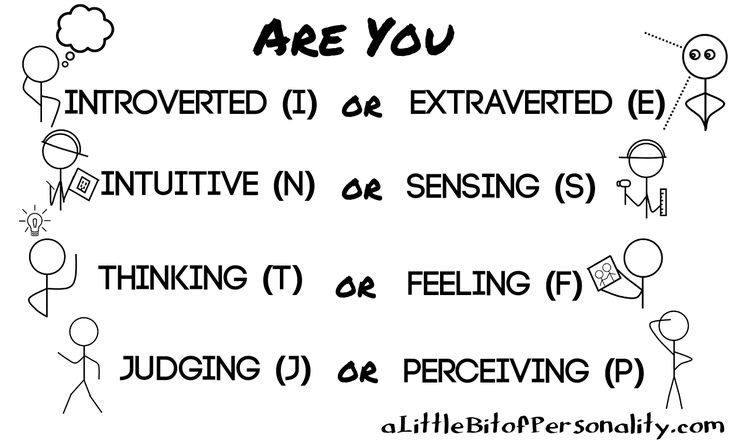
In relationships, INTJs need an intelligent partner who can appreciate and share their taste for unspoken truth and hidden meaning. INTJs get along best with other intuitive types, especially ENFPs. According to David Keirsey, an American psychologist and author of Please Understand Me, INTJ is the best match type for friendship and romance - ENFP. Keirsey believed that the most important factor in type compatibility was shared perception. All other letters in the four-letter names ENFP and INTJ are reversed except for N. ENFPs use Ne (extraverted intuition) while INTJs use Ni (introverted intuition). Although they use different forms of intuition, these two types nevertheless share a love of opportunity, are not burdened by tradition, and are not inclined to do what they have always done. They are both people of ideas and they are likely to spend countless hours discussing interesting topics and exchanging ideas with each other.
Any partner who understands that INTJs have wry and sometimes dark humor will likely work well with them.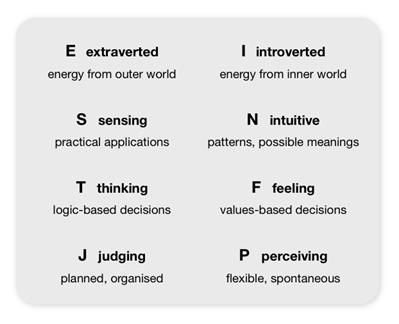 INTJs tend to ward off romantic prospects from unrealistic demands and expectations. In the end, they are often disappointed, and some, unfortunately, stop looking altogether. INTJs sometimes annoy their partners when they try to intervene and instruct them how to act the way they think. This can be especially true when it comes to areas that the other person is proud of. INTJs may need to beware of overly controlling or pushy advice and not be offended when others choose not to follow their suggestions.
INTJs tend to ward off romantic prospects from unrealistic demands and expectations. In the end, they are often disappointed, and some, unfortunately, stop looking altogether. INTJs sometimes annoy their partners when they try to intervene and instruct them how to act the way they think. This can be especially true when it comes to areas that the other person is proud of. INTJs may need to beware of overly controlling or pushy advice and not be offended when others choose not to follow their suggestions.
Although they probably have a strong libido within them, INTJs struggle with controlling their sexual interests with their intellectual interests. In many cases, the former are subordinate to the latter. Sex for them is as mental as it is physical. If the relationship is falling apart, they may move on, but will first seek to end it. Breaking emotional bonds is harder than they think, but they do it because they believe it is the right thing to do and are usually firm in their decision.

